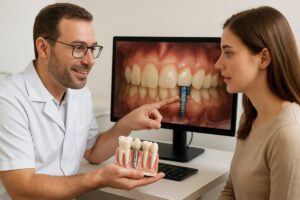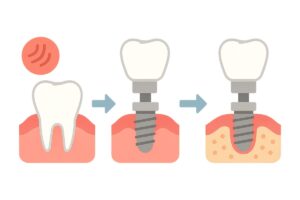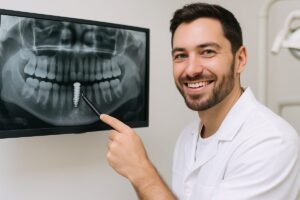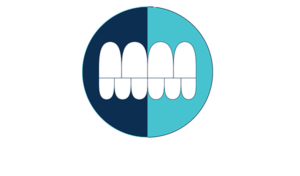Looking for clear dental implants info in Midwest City, OK? This short guide explains what implants are, how they work, who they help, risks and benefits, basic costs, and where to get help. Read on for practical facts and next steps so you can decide if implants are right for you.
What Are Dental Implants?
Dental implants are replacement tooth roots made of titanium that anchor new teeth. A complete implant restoration has three parts: the titanium post (the implant), the abutment (connector), and the crown (the visible tooth). Unlike bridges or dentures, implants replace the whole tooth structure — root and crown — which helps chewing, appearance, and bone health.
How Dental Implants Work
Osseointegration — the bone connection
After an implant is placed, the jawbone gradually fuses to the titanium surface. This process, called osseointegration, takes weeks to months and creates a very stable foundation for a replacement tooth. Because bone bonds to titanium, implants feel and function much like natural teeth.
Common implant restorations
Single crown: One implant supports a single tooth—great for one missing tooth without affecting neighbors.
Implant-supported bridge: Two or more implants can support a bridge, replacing several adjacent teeth without relying on other teeth.
All-on-4® full-arch restorations: Four strategically placed implants support a full arch of teeth, restoring a whole upper or lower set with fewer implants and faster recovery.
Who Is a Good Candidate for Dental Implants?
Good candidates are generally in good overall health, have healthy gums, adequate jawbone, and realistic expectations. Heavy smokers, uncontrolled diabetes, or severe gum disease can complicate treatment. Many patients who lack bone can still get implants after bone grafting or sinus lifts. Your dentist will explain alternatives and preparatory treatments.
The Typical Implant Timeline: What to Expect
Consultation & planning
Your first visit includes an exam, X-rays or CBCT imaging, and a digital treatment plan. Digital planning helps place implants precisely and predictably.
Surgery and healing
During surgery the implant is placed in the jaw. Some patients receive a temporary tooth that same day. Healing (osseointegration) usually takes several weeks to a few months.
Final restoration
Once integrated, the abutment and crown are attached. Patients notice improved chewing, speech, and a natural look and feel.
Benefits and Risks
- Benefits: natural appearance, better chewing, long-lasting results, and bone preservation.
- Risks: infection, implant failure, nerve or sinus issues. Clinicians reduce risks with careful planning, sterile technique, and follow-up care.
Costs, Insurance, and Payment Options
Costs vary by number of implants, bone grafting, type of restoration, and lab fees. Many practices accept insurance for parts of treatment and offer financing (CareCredit, Cherry, Proceed Finance). Ask your provider about payment plans and pre-approval.
Common Patient Questions — Quick FAQs
How long do implants last? With good care, implants often last decades or a lifetime.
Does implant surgery hurt? Most patients experience mild to moderate discomfort managed with medication and recover quickly.
Can anyone get All-on-4®? Many people with full-arch tooth loss are candidates, but a clinical exam and imaging determine suitability.
What is the difference between an implant and a bridge? Implants replace the root and crown without altering adjacent teeth; bridges attach to neighboring teeth and may affect them long term.
Why Choose Dentistry By Design for Dental Implants
Dentistry By Design in Midwest City, OK, led by Dr. Edward Harroz, Jr. and Dr. Edward Harroz, III, offers full implant services under one roof. The team uses digital planning, in-house surgical suites, CEREC® same-day crowns, All-on-4® capability, ozone therapy options, and multiple sedation choices to keep you comfortable. Their approach focuses on clear education, transparent plans, and long-term outcomes.
For personalized dental implants info in Midwest City, OK, request a consultation. The team can explain treatment options, financing, and sedation to create a plan that fits your needs and lifestyle.






